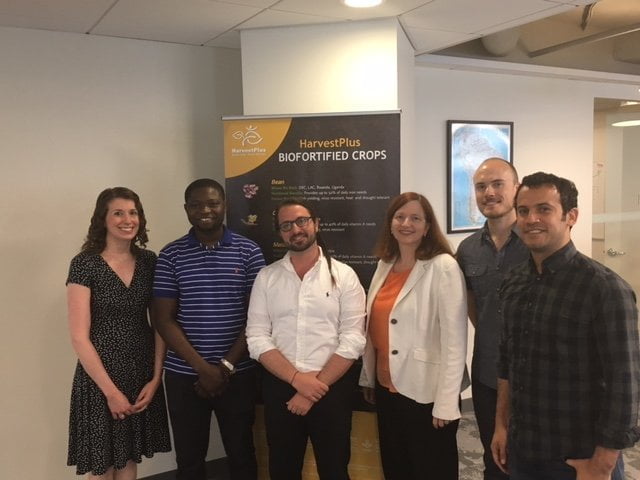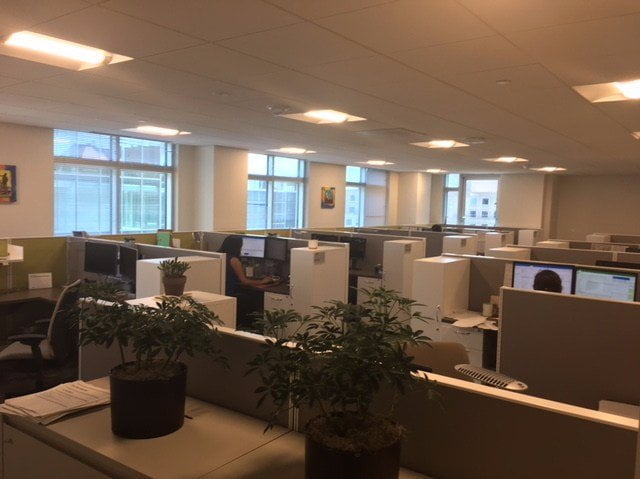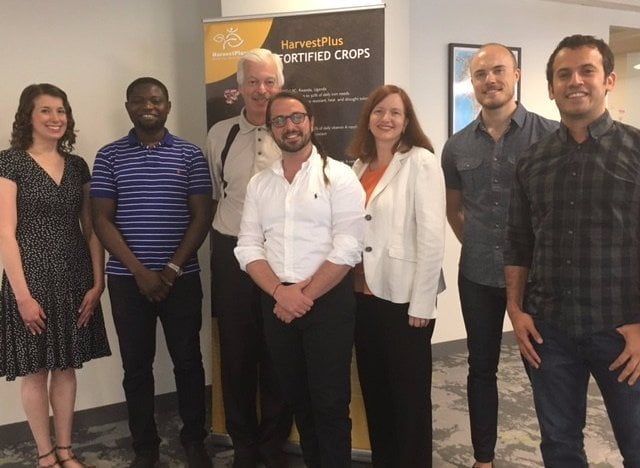Better Than Most is a regular feature of The Business of Giving examining the best places to work among social good businesses and nonprofit organizations.
Denver: One of the 8 semi-finalists in the MacArthur Foundation’s 100&Change competition is HarvestPlus and as you might suspect an exceptional organization like HarvestPlus also has an exceptional corporate culture. So I made my way down to Washington DC to check it out. We’ll start the segment with their CEO, Bev Postma, and then hear from some of the other members of the team.

Beverley: Well, first of all, people have a work ethic off the scale. My challenge is telling people to go home in the evening because they’re so passionate about what they do. But we have a very good work-life balance. We celebrate—just yesterday, we had our regular “Celebrate the new babies day.” We’ve got five new arrivals in the last few months. What we do is we celebrate family. We celebrate our extended families. We know that our families are our support system in HarvestPlus, so we make sure that they’re welcomed into the organization. Whenever we have events, we invite extended members of our staffs’ families and we consider ourselves all really working towards the same goals.
Adewale: At HarvestPlus, as you can see, diversity is its key strength of HarvestPlus and biofortification is our language. Biofortification itself is diversity. [Begin] different crops to work together, to bring more nutrient and a diverse of nutrient, and that what’s you can see in the strength of talent at HarvestPlus as well. And I can remember the first time I was interviewed for this job. What I like the most is that everybody was involved in my interviewing process, so people ask me different questions. Everybody raised their concerns and I was able to openly address them. I could see that I am coming into a family and that’s what you can see at HarvestPlus. We have a lot of groups of small teams, so you can feel like you belong to a family or a group of friends. And that’s exactly how we work at HarvestPlus.
Jose: What I love in HarvestPlus is the fact that they provide you all the resources to tackle the specific problem. And you connect with your staff based in Colombia, based in Uganda through Whatsapp. We have Whatsapp groups. We post questions and people are over-passionate about the questions we pass. I feel like I have so many degrees of freedom when I come every day to HarvestPlus to answer these specific questions.
Peg: Said to me that our founder and at the time CEO, she had never in her six years at HarvestPlus once heard him raise his voice. And I thought that that can’t be true; that’s superhuman. But it was true. His personality has really permeated our culture. He was someone who had an idea that people said was too good to be true and would never work. They said it wouldn’t be possible to include extra vitamins on plants. They said, “Even if you can do that, no farmer will grow them. Even if that happens, nobody will eat them because Vitamin A can turn the crops orange. Who’s going to eat orange food? Well yes, you can do that, but it won’t be cost-effective.” It turns out, it is. He spent years and years just persisting in his humble way and now 26 million people are growing and eating the stuff. And last year, he won something called “The World Food Prize”. He inspired us. He talked about how it was we who had done it not him. His first reaction when he won was to say, “Oh gosh, they really should have also given it to the person who’s the head of our crop reading.” That was his first reaction. So that was something that is really unusual and has truly affected our corporate culture.

Brittany: Nearly every single one ask me: What are my opportunities for growth here? It’s generally for administration job, so people want their foot in the door at an organization that’s doing international development. I love when I get that question because I love being able to answer it by telling them that the great thing about HarvestPlus is how accessible everyone is and how multi-disciplinary we are. If you want to know more about agricultural economics, if you want to know more about advocacy, if you want to learn more about the gender work that we do, there’s opportunity to engage with and speak conversationally with someone about that.
Jamie: To speak a little bit about the hiring process, I initially thought: Wow, this is kind of intense! I went through several rounds of interviews with the team and with HR and various people I would be working with. But I think it actually really speaks to the level of dedication that the organization has for– a fit not just technically but also culturally, also personality wise. I see a lot of dedication to building that kind of family environment. Because we’re such a culturally and professionally diverse organization, there is the potential for that to be a great asset, but also an insurmountable hurdle. I think the hiring process and that level of dedication given to making sure the fit is there is really important to building that bridge and steering the diversity that we have in the right direction.
Benjamin: And one thing that has helped me track my progress and development as an employee throughout that process has been the review and feedback mechanisms that we have within this organization. There are standard protocols and processes for evaluations of employee work, setting of goals, and also staff development is a part of your annual work plan. Also in addition to these more standardized feedback mechanisms, I have found a lot of value in the fact that managers from all the way in the top of organization across a number of different countries and all the way to even our consultants who assists us on things we don’t know are always willing to provide candid honest feedback on an ad-hoc basis or in the moment. I found great value in people’s willingness to help me to grow as an employee as I have transitioned from an entry level employee throughout my career with this organization. It has really helped me both learned and also set a trajectory for my future in terms of how I envisioned myself developing with this organization in the future.
Adewale: Outside HarvestPlus, people think HarvestPlus is an organization with like 1000 employees. We do so much but we are very few. But one thing that is so unique about HarvestPlus in terms of our culture, is the fact that when there’s a task on the table, everybody come and put the hand on the deck and the job gets done. And that’s exactly what’s going on now with some of the high-priority level tasks that are ongoing in the organization. Everybody’s hands are on the deck right from those in the field and to those on the headquarters. And this is what you see in a confident leadership.

Denver: I want to thank all those who participated in this piece: Peg Willingham, Brittany Leoboldt, Benjamin Uchitelle-Pierce, Adewale Oparinde, Jose Funes and Jamie Leidelmeyer. If you want to hear this again, read the transcript or see pictures of the participants in the HarvestPlus offices, you can find them all at denverfrederick.wordpress.com and while you’re there, check my full interview with Bev Postma, the CEO of HarvestPlus.
The Business of Giving can be heard every Sunday evening between 6:00 p.m. and 7:00 p.m. Eastern on AM 970 The Answer in New York and on iHeartRadio. You can follow us @bizofgive on Twitter, @bizofgive on Instagram and at http://www.facebook.com/BusinessOfGiving

